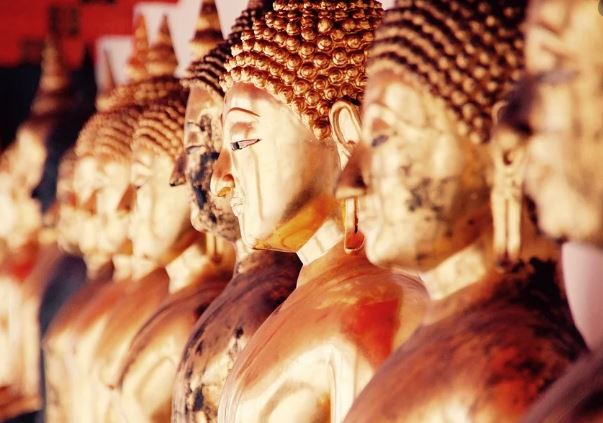Buddhism is a philosophy, a way of life, a religion to some but to others mainly a system of ethics.

The more than 300 million Buddhists in the world follow several different schools of Buddhism, but all schools are based on the teachings of the historical Buddha, Siddharta Gautama who was born 2,500 years ago in what is today Nepal, and started teaching after reaching enlightenment under a bodhi tree in Bodghaya, India. The word budhi translates as ‘to awaken’ and means the awakening (enlightenment) of the Buddha.
The teachings and doctrines of the Buddha are called dhamma (or dharma).
The Buddha taught the Middle Way: a life of moderation, not one of indulgence, but not one of ascetic renunciation or self-torment either. Some of the basic concepts of Buddhism are the Four Noble Truths, the Eightfold Path, and the concepts of rebirth and karma.
The Four Noble Truths are:
1) all life is suffering (dukkha): the human life is full of pain, illness, sorrow, aging and eventually death
2) suffering is caused by desire (craving)
3) suffering can be overcome by the cessation of desire
4) the end of suffering (nirvana) can be achieved by the Noble Eight-Fold Path.
The Eight-Fold Path includes:
1) right understanding
2) right thought
3) right speech
4) right action
5) right livelihood
6) right effort
7) right mindfulness
8) right concentration.
Life is a cycle of rebirths (samsara); we are all born again and again until we make a commitment to follow the 8-fold path towards enlightenment. Our lives are shaped by karma: the law of cause and effect. All our actions and even our thoughts have an effect – a good or a bad one. Karma is often misunderstood in the West and is described in a fatalistic sense, as a destiny one is not able to control. Instead, the law of karma highlights the need to take responsibility for our actions, as every action and every thought has an effect, and it is these effects (from this life and from previous lives) that shape our existence as it is today.
One should look at the intention behind a thought or a deed, the effects the thought or action has on oneself, and the effect the action or thought would have on others. “Good karma”, or merit, can be accumulated through meritorious deeds, for example giving to the poor and the needy.





